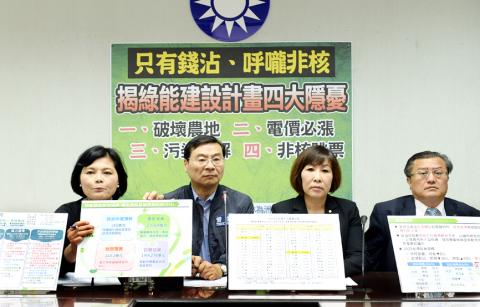The Chinese Nationalist Party (KMT) legislative caucus yesterday criticized the Cabinet’s Forward-Looking Infrastructure Development Program for the development of renewable energy sources as ill-advised and an attempt by the Democratic Progressive Party (DPP) to seek re-election.
The lawmakers said the eight-year, NT$880 billion (US$28.71 million) Forward-Looking program — which the government says aims to develop renewable energy sources, railway transportation, digital and water infrastructures and to minimize developmental gaps between urban and rural areas — is just an effort to funnel money toward DPP-governed municipalities, not efficient budgeting.
The government — on top of an annual NT$25.6 billion budget — has planned a special NT$24.32 billion budget, NT$16.2 billion of which is to be used to construct a “green” energy park in the Shalun area (沙崙) of Tainan’s Gueiren District (歸仁) to serve as a testing ground for renewable energy technologies.

Photo: Lin Cheng-kung, Taipei Times
The park should be built in Yunlin County, the nation’s largest producer of solar energy, instead of DPP-governed Tainan, KMT Legislator Chang Li-shan (張麗善) said.
“The park should be built in the right location if it is to deal with power shortages and the shortfall of renewable energy infrastructure. No wonder the budget has been criticized as pork-barrel spending to favor certain constituencies,” Chang said.
Questioning the government’s pledge to phase out nuclear energy and increase the nation’s renewable energy capacity to 20 percent of the total power supply by 2025, she said Taiwan only has 5,300 hectares on which solar farms could be built, making the pledge either an unfulfillable promise or one that would lead to a mass conversion of farmlands, which would further hurt the nation’s alarmingly low food self-sufficiency rate.
Electricity rates might increase with the development of renewable energy sources, as an estimated NT$1.75 trillion from the public and private sectors is to be invested in the industry from this year through 2024, but the government has not warned the public about possible rate hikes, Chang said.
“Although solar energy is renewable, solar-panel manufacturing generates a large amount of liquid pollutants, while disused solar panels and batteries are also a problem. The government should explain its pollution prevention measures and recycling plans,” the lawmaker said.
KMT Legislator Yosi Takun (孔文吉) said that some local government officials were not allowed to attend a hearing at the Legislative Yuan yesterday on the Forward-Looking program, including New Taipei City Economic Development Department Director Shi Wei-chuan (施威全).
However, Shi was later admitted to the hearing, the first of six planned hearings.
“For many KMT-governed municipalities that are excluded from the Forward-Looking program, a hearing is the only occasion where they might seek inclusion, but they are prevented from attending,” Yosi Takun said.
“The NT$880 billion was hastily approved — without any cost-effectiveness analysis — and the DPP is unwilling to listen to local governments’ opinions. What kind of a ruling party does that?” KMT Legislator William Tseng (曾銘宗) said.

Alain Robert, known as the "French Spider-Man," praised Alex Honnold as exceptionally well-prepared after the US climber completed a free solo ascent of Taipei 101 yesterday. Robert said Honnold's ascent of the 508m-tall skyscraper in just more than one-and-a-half hours without using safety ropes or equipment was a remarkable achievement. "This is my life," he said in an interview conducted in French, adding that he liked the feeling of being "on the edge of danger." The 63-year-old Frenchman climbed Taipei 101 using ropes in December 2004, taking about four hours to reach the top. On a one-to-10 scale of difficulty, Robert said Taipei 101

Nipah virus infection is to be officially listed as a category 5 notifiable infectious disease in Taiwan in March, while clinical treatment guidelines are being formulated, the Centers for Disease Control (CDC) said yesterday. With Nipah infections being reported in other countries and considering its relatively high fatality rate, the centers on Jan. 16 announced that it would be listed as a notifiable infectious disease to bolster the nation’s systematic early warning system and increase public awareness, the CDC said. Bangladesh reported four fatal cases last year in separate districts, with three linked to raw date palm sap consumption, CDC Epidemic Intelligence

Taiwanese and US defense groups are collaborating to introduce deployable, semi-autonomous manufacturing systems for drones and components in a boost to the nation’s supply chain resilience. Taiwan’s G-Tech Optroelectronics Corp subsidiary GTOC and the US’ Aerkomm Inc on Friday announced an agreement with fellow US-based Firestorm Lab to adopt the latter’s xCell, a technology featuring 3D printers fitted in 6.1m container units. The systems enable aerial platforms and parts to be produced in high volumes from dispersed nodes capable of rapid redeployment, to minimize the risk of enemy strikes and to meet field requirements, they said. Firestorm chief technology officer Ian Muceus said

MORE FALL: An investigation into one of Xi’s key cronies, part of a broader ‘anti-corruption’ drive, indicates that he might have a deep distrust in the military, an expert said China’s latest military purge underscores systemic risks in its shift from collective leadership to sole rule under Chinese President Xi Jinping (習近平), and could disrupt its chain of command and military capabilities, a national security official said yesterday. If decisionmaking within the Chinese Communist Party has become “irrational” under one-man rule, the Taiwan Strait and the regional situation must be approached with extreme caution, given unforeseen risks, they added. The anonymous official made the remarks as China’s Central Military Commission Vice Chairman Zhang Youxia (張又俠) and Joint Staff Department Chief of Staff Liu Zhenli (劉振立) were reportedly being investigated for suspected “serious